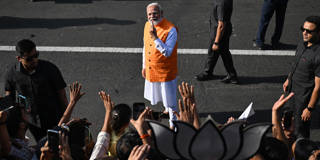OnPoint Subscriber Exclusive
The Big Picture brings together a range of PS commentaries to give readers a comprehensive understanding of topics in the news – and the deeper issues driving the news. The Big Question features concise contributor analysis and predictions on timely topics.

Will India’s Election Destroy Its Democracy?
The ongoing Indian general election amounts to a clash between the ruling Bharatiya Janata Party and the Indian National Developmental Inclusive Alliance (INDIA), an unwieldy coalition of more than two dozen opposition parties. As the third phase of the seven-phase exercise begins, the BJP – led by the highly popular Prime Minister Narendra Modi – appears set for a comfortable victory.
Gaurav Dalmia, Chairman of Dalmia Group Holdings, argues that the reason the BJP is expected to do so well is not the party’s “explicitly Hindu-nationalist agenda.” Beyond being led by “the most charismatic Indian prime minister in recent memory,” the BJP has built up its “organizational strength, promoted meritocracy within its ranks, widened its voter base, and competently delivered benefits to the poor.”
According to Princeton’s Ashoka Mody, however, the BJP government is almost certainly overstating the progress it has made on reducing poverty, using consumption data that “appear to have been chosen to align with [its] preferred narrative.” In reality, “poverty remains deeply entrenched in India, and broader deprivation appears to have increased as inflation erodes incomes of the poor.”
There is also “good reason to believe” that official figures are understating the unemployment rate, points out Shashi Tharoor, a representative of the opposition Indian National Congress. In his view, “the public has had enough of the BJP’s broken promises,” including its pledge to create jobs, and may well embrace the opposition in the ongoing election.
Still, the odds are stacked against the opposition – and Indian democracy. However weak the BJP’s actual record, suggests Pranab Bardhan of the University of California, Berkeley, the combination of “shrewd political tactics and powerful false narratives” will probably be enough to deliver an “easy victory” to the party. “With that,” he warns, “the erosion of Indian democracy will almost certainly accelerate.”
As Debasish Roy Chowdhury shows, that process is already alarmingly far along. “Modi’s government has spent a decade eroding civil liberties and minority rights, curtailing dissent, undermining democratic institutions, and building a cult of personality.” As a result, “India is no longer the model free-market democracy that Westerners spent years imagining, encouraging, and touting.” In fact, the vote now underway “has all the hallmarks of a despotic election.”